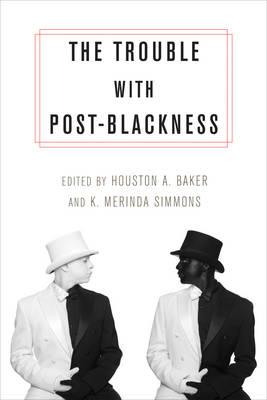
Stock image for illustration purposes only - book cover, edition or condition may vary.
The Trouble with Post-Blackness
Houston A. (E Baker
€ 37.83
FREE Delivery in Ireland
Description for The Trouble with Post-Blackness
Paperback. Editor(s): Baker, Houston A.; Simmons, K. Merinda. Num Pages: 288 pages. BIC Classification: 1KBB; JFSL3. Category: (P) Professional & Vocational. Dimension: 229 x 152. .
An America in which the color of one's skin no longer matters would be unprecedented. With the election of President Barack Obama in 2008, that future suddenly seemed possible. Obama's rise reflects a nation of fluid populations and fortunes, a society in which a biracial individual could be embraced as a leader by all. Yet complicating this vision are shifting demographics, rapid redefinitions of race, and the instant invention of brands, trends, and identities that determine how we think about ourselves and the place of others. This collection of original essays confronts the premise, advanced by black intellectuals, that the Obama administration marked the start of a post-racial era in the United States. While the transcendent and post-racial black elite declare victory over America's longstanding codes of racial exclusion and racist violence, their evidence relies largely on their own salaries and celebrity. These essays strike at the certainty of those who insist that life, liberty, and the pursuit of happiness are now independent of skin color and race in America. They argue, signify, and testify that post-blackness is a problematic mythology masquerading as fact-a dangerous new race science motivated by black transcendentalist individualism. Through rigorous analysis, these essays expose the idea of a post-racial nation as a pleasurable entitlement for a black elite, enabling them to reject the ethics and urgency of improving the well-being of the black majority.
Product Details
Publisher
Columbia University Press
Format
Paperback
Publication date
2017
Condition
New
Weight
28g
Number of Pages
288
Place of Publication
New York, United States
ISBN
9780231169356
SKU
V9780231169356
Shipping Time
Usually ships in 7 to 11 working days
Ref
99-1
About Houston A. (E Baker
Houston A. Baker is Distinguished University Professor at Vanderbilt University and a scholar of African American literature and culture. He is a member of the pioneering generation of the 1960s that sought to expand the canons and definitions of the humanities in the academy. He served as director of Afro-American studies and founded and directed the Center for the Study of Black Literature and Culture at the University of Pennsylvania. His book Betrayal: How Black Intellectuals Have Abandoned the Ideals of the Civil Rights Era received an American Book Award. K. Merinda Simmons is associate professor of religious studies at the University of Alabama. She is author of Changing the Subject: Writing Women Across the African Diaspora and coeditor, with Maha Marouan, of Race and Displacement: Nation, Migration, and Displacement in the Twenty-First Century. Her areas of research and publication combine literary, religious, and Southern studies, with critical emphases on theories of gender and race.
Reviews for The Trouble with Post-Blackness
An excellent collection and a timely intervention in a conversation with important ramifications for scholarship and civic life. There is both breadth and depth in these pieces, and a pleasing and engaging diversity of concerns and writing styles.
George Lipsitz, University of California, Santa Barbara, author of The Possessive Investment in Whiteness The Trouble with Post-Blackness courageously puts to rest the dangerous, delusory, and fabulous (as in 'fable') claim that we inhabit a post-racial America. Through these critically engaging essays, the concept of 'post-blackness' is indeed troubled, rendered turbid and untenable in an America in which black people continue to face ontological occlusion and existential foreclosure. This text refuses mythopoetic slogans and faddish signifiers, instead ethically grounding us in the temporal now and refusing to mock those black bodies that face an anti-black America that continues to mark them as dangerous, criminal, and existentially nugatory.
George Yancy, Duquesne University, author of Black Bodies, White Gazes: The Continuing Significance of Race A thoughtful, if not gentle, scholarly refutation of a controversial claim of a post-racial society. Kirkus Reviews This thoughtful, provocative, and only occasionally heavy-going collection of essays... persuasively argues that what Toure calls 'being like Barack' really just maintains normative whiteness as an untroubled, unanalyzed construct. Publishers Weekly An excellent collection of essays from impressive minds responding openly to what black identity was, is, and perhaps will be... Anyone with an expressed interest in racial history and identity will enjoy this read. Library Journal
George Lipsitz, University of California, Santa Barbara, author of The Possessive Investment in Whiteness The Trouble with Post-Blackness courageously puts to rest the dangerous, delusory, and fabulous (as in 'fable') claim that we inhabit a post-racial America. Through these critically engaging essays, the concept of 'post-blackness' is indeed troubled, rendered turbid and untenable in an America in which black people continue to face ontological occlusion and existential foreclosure. This text refuses mythopoetic slogans and faddish signifiers, instead ethically grounding us in the temporal now and refusing to mock those black bodies that face an anti-black America that continues to mark them as dangerous, criminal, and existentially nugatory.
George Yancy, Duquesne University, author of Black Bodies, White Gazes: The Continuing Significance of Race A thoughtful, if not gentle, scholarly refutation of a controversial claim of a post-racial society. Kirkus Reviews This thoughtful, provocative, and only occasionally heavy-going collection of essays... persuasively argues that what Toure calls 'being like Barack' really just maintains normative whiteness as an untroubled, unanalyzed construct. Publishers Weekly An excellent collection of essays from impressive minds responding openly to what black identity was, is, and perhaps will be... Anyone with an expressed interest in racial history and identity will enjoy this read. Library Journal
